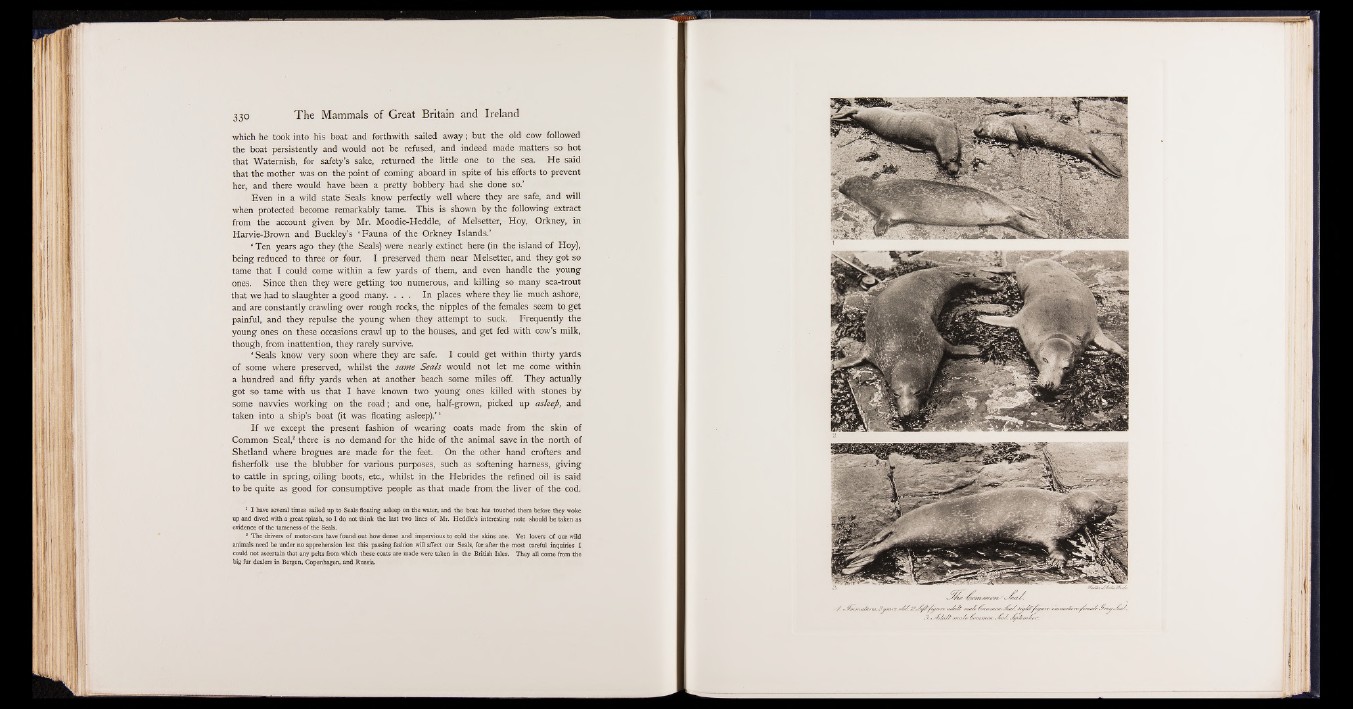
which he took into his boat and forthwith sailed away; but the old cow followed
the boat persistently and would not be refused, and indeed made matters so hot
that Waternish, for safety’s sake, returned the little one to the sea. He said
that the mother was on the point of coming aboard in spite of his efforts to prevent
her, and there would have been a pretty bobbery had she done so.’
Even in a wild state Seals know perfectly well where they are safe, and will
when protected become remarkably tame. This is shown by the following extract
from the account given by Mr. Moodie-Heddle, of Melsetter, Hoy, Orkney, in
Harvie-Brown and Buckley’s ‘ Fauna of the Orkney Islands.’
‘ Ten years ago they (the Seals) were nearly extinct here (in the island of Hoy),
being reduced to three or four. I preserved them near Melsetter, and they got so
tame that I could come within a few yards of them, and even handle the young
ones. Since then they were getting too numerous, and killing so many sea-trout
that we had to slaughter a good many. . . . In places where they lie much ashore,
and are constantly crawling over rough rocks, the nipples of the females seem to get
painful, and they repulse the young when they attempt to suck. Frequently the
young ones on these occasions crawl up to the houses, and get fed with cow’s milk,
though, from inattention, they rarely survive.
‘ Seals know very soon where they are safe. I could get within thirty yards
of some where preserved, whilst the same Seals would not let me come within
a hundred and fifty yards when at another beach some miles off. They actually
got so tame with us that I have known two young ones killed with stones by
some navvies working on the road; and one, half-grown, picked up asleep, and
taken into a ship’s boat (it was floating asleep).’ 1
If we except the present fashion of wearing coats made from the skin of
Common Seal,2 there is no demand for the hide of the animal save in the north of
Shetland where brogues are made for the feet. On the other hand crofters and
fisherfolk use the blubber for various purposes, such as softening harness, giving
to cattle in spring, oiling boots, etc., whilst in the Hebrides the refined oil is said
to be quite as good for consumptive people as that made from the liver of the cod.
1 I have several times sailed up to Seals floating asleep on the water, and the boat has touched them before they woke
up and dived with a great splash, so I do not think the last two lines of Mr. Heddle’s interesting note should be taken as
evidence of the tameness of the Seals.
1 The drivers of motor-cars have found out how dense and impervious to cold the skins are. Yet lovers of our wild
animals need be under no apprehension lest this passing fashion will affect our Seals, for after the most careful inquiries I
could not ascertain that any pelts from which these coats are made were taken in the British Isles. They all come from the
big fur dealers in Bergen, Copenhagen, and Russia.